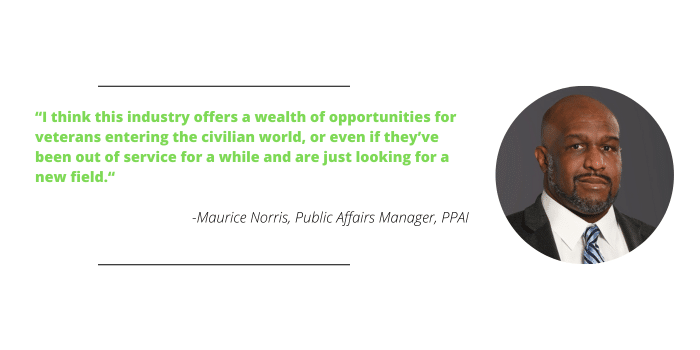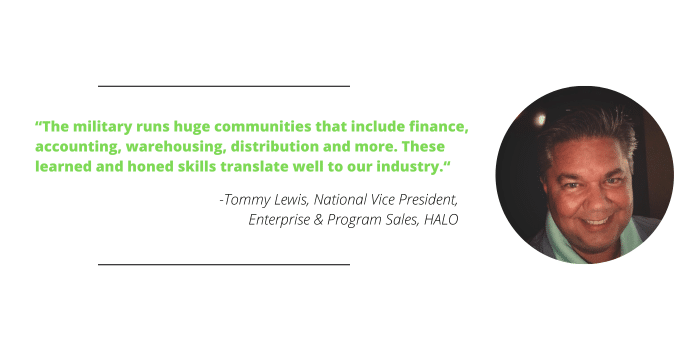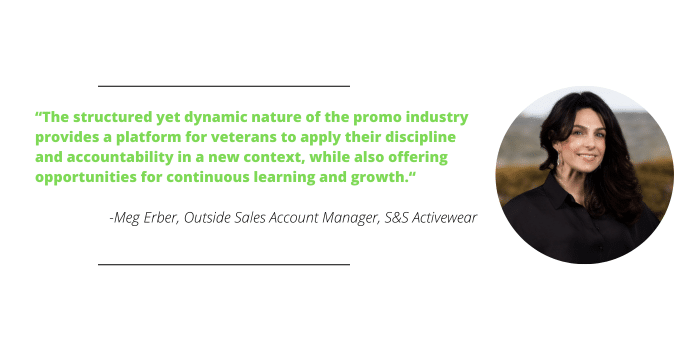Those in the promotional products world might argue that success within the industry takes a special type of person. It requires the ability to improvise within a structured system, to analyze and work within a budget, to show leadership skills, as well as to follow orders. Perhaps most of all, it demands the work ethic and ingenuity to get the job – whatever that might be in a given week – done with a sense of pride.
A couple days navigating all the booths at The PPAI Expo will lead anyone to acknowledge that it also requires a certain amount of endurance along with a tendency to keep your head on a swivel.
Of course, it goes without saying that these challenges are all trivial compared to what veterans of the U.S. military have traversed in their times of service. Yet several veterans with prominent roles in promo say that, in an industry that favors goal-oriented people, that are a lot of overlapping skills that people with their backgrounds bring to promotional products.
- More than 200,000 service members return to civilian life each year.
- Finding work, let alone establishing a meaningful career path, can prove difficult for many of those service members.
- As an industry that many individuals stumble upon while attempting to blaze their own trails, promo can be a welcome environment for military veterans.

Ahead of Veteran’s Day on November 11, PPAI Media spoke to a few U.S. military veterans with notable roles in promo about how their skills have served them well in the industry, why it can be a great fit and what companies could be doing to reach that demographic.
‘Structured Yet Dynamic’: Overlapping Skillsets Veterans Bring To Promo
Tommy Lewis, national vice president, enterprise and program sales at HALO – the No. 2 distributor in the PPAI 100 – spent just under six years in the U.S. Navy in the 1990s. His responsibilities required a deep expertise and proficiency in his duties.
- Lewis spent most of his naval career as an instructor at a nuclear plant training facility specializing in reactor operations, water chemistry and radiological controls.
- Eventually, he transferred to the USS Kamehameha, a nuclear-powered submarine.
Lewis makes the point that the skills and knowledge that veterans bring to the workforce extend well beyond the less concrete traits so many associate with them – like “courage” or “integrity” – and can include specific and applicable job-related experience.
Each sector of each branch of the military manages a budget so large that Lewis calls it “its own economy.” With that are infrastructures that require workers in:
- Supply chain
- Technology
- Cyber security
- Project management
- Process and strategy
“The military runs huge communities that include finance, accounting, warehousing, distribution and more,” says Lewis. “These learned and honed skills translate well to our industry.”

Meg Erber, outside sales account manager for S&S Activewear and one of PPAI’s 2023 #Online18, joined the U.S. Navy as soon she turned 18, following in the footsteps of her grandfather who was a Navy captain. She spent eight years in the Navy before returning to civilian life and trying to figure out what to do as a career for the first time in her adult life. Eventually, she found promo.
After nearly a decade of living such a specific lifestyle, Erber says that the aspect of the promo industry that started to feel familiar was the dynamic that so many notice once they have attended a few trade shows: the supportive network of relationships.
“The promo industry offered up its own community and relationships,” Erber says. “Much like the military, the promotional products industry thrives on a sense of community and relationship-building.”
- Many newcomers to the industry are refreshed by the way competitors often carry themselves as if they are part of one big team. The success of the industry is a shared goal with everyone playing their part.
- For individuals with high stakes experience with teamwork and community building, it might be a welcome dynamic.
“It’s an ecosystem where camaraderie and networking are at the heart of success,” says Erber. “This aspect can provide a sense of belonging, making the transition smoother for veterans if placed in the right role.”
PPAI Public Affairs Manager Maurice Norris served in the U.S. Army. “I think this industry offers a wealth of opportunities for veterans entering the civilian world, or even if they’ve been out of service for a while and are just looking for a new field,” he says. “The broad spectrum of products and services means the door is wide open for veterans with a variety of talents and skillsets. I’ve also learned that many people found their way to this industry from another line of work, myself included, so it makes sense for former military personnel to find a place in promo.”
Shane Whitecloud, owner of distributor Team Valor, is a U.S. Navy service-connected disabled veteran, which means he was injured while in active duty. He mentions the adjustment period that often comes after a military member ends his service.
“When a military member hangs up their uniforms and switches from active to veteran, the change in culture can be overwhelming,” Whitecloud says.
- While many factors go into those transitions, structured roles with spaces to excel can be a reasonable middle ground for the adjustment.
“Give us a mission and we won’t stop until that mission is complete,” Whitecloud says.
Erber has worn many hats in promo, and she credits her military career with giving her the confidence to master her roles and seek greater responsibility. She attributes her success and longevity in the industry to that sense of mission that Whitecloud refers to.
“The structured yet dynamic nature of the promo industry provides a platform for veterans to apply their discipline and accountability in a new context, while also offering opportunities for continuous learning and growth,” Erber says.
U.S. Air Force veteran Tameka Peoples only started her company, Seed2Shirt, of which she is the CEO, whileshe was in the process of acquiring shirts for an event held by the Peoples Foundation, her California-based non-profit supporting members of the military and veterans. Buying those shirts from local and Black-owned sources was more difficult than she anticipated. So, that same sense of mission kicked in.
“My vision is to have the first Black-owned T-shirt manufacturing company that provides ethically sourced blank T-shirts that supports Black people from cotton seed to cotton shirt,” Peoples said of starting Seed2Shirt.

Working With Veterans
Erber makes a fantasy football analogy in regard to veterans as potential applicants for a position within a promo company, referring to them as “sleepers,” as in players that the majority of people are passing over for bigger and flashier names.
“They are the player who is undervalued or overlooked but has the potential to outperform players who are seemingly more established,” Erber says. “While they may not have the conventional corporate background or a high-profile college degree that typically catch the eye of HR, their military experience has equipped them with a unique set of skills and a distinctive perspective that can prove to be invaluable in a corporate setting, especially in leadership roles.”
Lewis spends some of his off-time volunteering with veterans who are struggling to find consistent employment despite having clear skills and knowledge.
“They know their stuff and are high-value talents,” Lewis says.
- In his experience, their experience is often couched in language that “does not fluidly relate well in corporate America.” Translating that experience into its applicable nature in a job is something that doesn’t come naturally for most people.
“Our industry has plenty of opportunity to leverage the developed skills and extremely talented individuals transitioning to civilian life,” Lewis adds.
Both Erber and Lewis advise companies to consider partnering with military transition programs for help in finding veterans ready and willing to begin their career.
One potential resource is the DOD SkillBridge program.
- Through the program, qualifying companies can be partnered with a military service member with 180 days or less of service remaining before their discharge.
- These employees will be paid by the military to work for the company for the time until their discharge.
- The company receives labor paid for by the military and a preview of a potential future applicant for a position.
- The veteran receives work experience to build toward a smoother transition out of service.
Norris also points out that the U.S. Department of Labor’s website assists companies that are committed to hiring veterans.
To Erber, the number of success stories concerning veterans in promo is only hindered by the number of people aware of the potential fit.
“Certainly, there exists a mutual lack of awareness on both sides that may lead to the underutilization of the valuable talent pool that veterans represent,” Erber says.
Lewis agreed that, if nothing else, the demographic is a source of labor in a landscape when finding workers has increased in difficulty.
“There is talent [among veterans] to be found and hired,” Lewis says.


